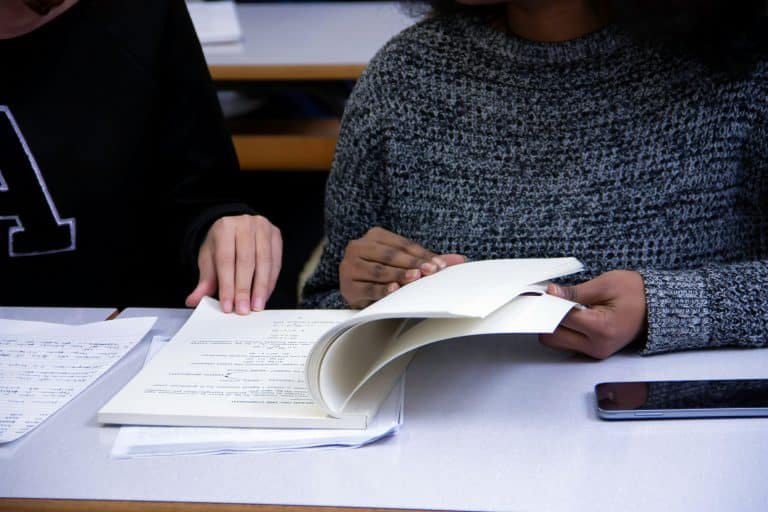End Teacher-Blaming:
How (and Why) You Should Avoid It
.
I can still remember the indignation that burned in my chest when my teacher marked something wrong on my exam, despite giving us that information in a lecture. I knew I was right – it was right there in my notes from two weeks prior. How dare he?! I jabbed my notebook, beginning to launch into a monologue about why I’d answered B and why I deserved a point. He did end up giving me a point, but not before looking at me like I was a little bit crazy. And I was – while also being demanding and obnoxious. Of course, I was only blaming him for not giving me one measly point… while some teachers get blamed for much, much more. Teacher-blaming – from students and their parents – is an epidemic, and it’s really not fair for our hardworking educators. Let’s talk about why.
This 2017 article from The Guardian, “Teacher knows best? Not any longer as parents muscle in on the classroom,” highlights an alarming trend in schools. Teachers are facing constant scrutiny (and often harassment, or borderline harassment) from parents of students. The article attributes this change to a few things: closer parental scrutiny of schools, much higher academic expectations for children, and technology. Parents can get almost real-time updates on scores, grades, and attendance, and there is more academic competition than ever before. Many parents are hyper-involved in their child’s education, and they have easier access to their child’s teacher through email and other messaging platforms.
.

.
Some of these changes are great! It’s so important to be involved in your child’s education, and it’s great that you can find out more about their performance before their twice a year report card. However, many teachers all over the globe are suffering from these changes. Where parents used to confront their child about a bad grade over dinner, now teachers are getting questioning emails. Teachers used to hear any parental complaints or concerns at parent-teacher conferences; now they’re being blasted on social media. Geoff Barton, an educator and general secretary of the UK-based Association of School and College Leaders, explained to The Guardian how it used to be. ““They’d send their child to school and at the end of school their child came out and they have a qualification, either a good one or a bad one depending on whether the child had worked hard or not,” Barton explained. “And, today, communication is so much quicker – access to teachers through email is so much quicker. That sometimes means there isn’t a detachment for parents or the school between what has happened and has been alleged.” In other words, teachers are almost always on-call, and parents can contact them whenever, about whatever.
As you can imagine, that makes a teacher’s job tougher than it needs to be. Their job is to teach our children, yet now they’re doing that on top of handling parents – parents who are often accusatory. Even parents who don’t teacher-blame often ask questions and expect responses that could be answered in other, old-fashioned ways… like talking to their child, reading the syllabus, or consulting with another parent. Teachers are typically at school early and don’t leave until late, and the last thing they need to be doing is spending an hour (or more) writing unnecessary parental emails.
.

.
Here are some things that I desperately urge students and parents to do, prior to blaming the teacher for a low grade, a missing assignment, or whatever else is causing irritation.
First, read all the written materials that teacher has passed out. Often, they’ll spell out all due dates and grading policies. If something is in the syllabus, schedule, or project outline, you cannot blame the teacher.
Second, find a class buddy (or two, or three). Students, find other students in the class that you can consult with about issues. Parents, befriend other parents of students! The teacher cannot respond to 30+ emails, and your “buddy” can probably answer some of your questions. If you’re outraged about something, and none of the other parents or students seem to be… don’t blame the teacher.
Third (and this one is for the parents), talk to your child before contacting their teacher. Find out if they really failed an assignment because their teacher “hates them,” or if they mayyybe forgot to do it. Be a detective, and try to figure things out before enlisting the help of the teacher. They have plenty on their plates, and you should have all the facts before contacting them.
Fourth (and this one’s for students), realize that teachers are there to teach, and prepare you for the real world. Sometimes things don’t seem fair, and it’s really OK. Plus, in the long run… it’s much better to suck it up, have a nice, respectful relationship with your teacher, and move on.
.

.
That said, teachers aren’t god. They can make mistakes – and the great majority are more than happy to discuss those with you. If you think they misgraded or overlooked something, there’s nothing wrong with having a polite conversation. Don’t take the approach I took: feverishly shoving your notebook under their nose. Instead, speak with them calmly, respectfully, and plead your case. Approach them with curiosity, and have a respectful conversation, instead of approaching them with blame and accusations.




